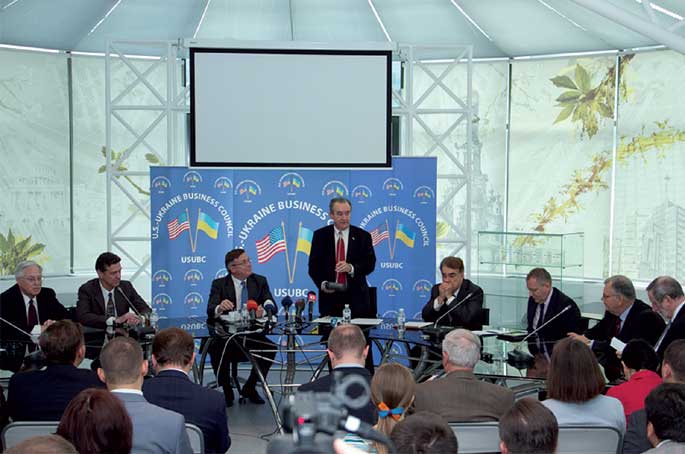
“Ekialdeko Grezia” deitu dio The Economistek Ukrainari, Munduko Bankuak eta Nazioarteko Diru Funtsak antzeko errezeta ezarri dielako krisiaren aurrean: gastu sozialen murrizketa basatiak herritar xehearen kaltean eta nazioarenak diren natur baliabideak multinazionalei eskaintzea. Gerraren atzean beti dago dirua.

Garai garratzak Ukrainako herritarrentzat, Kieveko legebiltzarrak martxo hasieran onartu dituen aurrekontuek iragartzen dutenez. Politika sozialetan, klase guztietako murrizketak. Inflazioa ofizialki –zenbait adituk diote askoz handiagoa dela– %28an daukan herrialdean jubilatuei pentsioak %15ean jaitsiko zaizkie. Tonu berean aurrekontuen atal orotan.
Neoliberalismoaren biblia den The Economist-ek “The new Greece in the east” kronikan azaldu du Nazioarteko Diru Funtsak (NDF) Kieveko gobernuarekin sinatu duen maileguan aurreikusten dela 2013tik 2017ra bitartean estatuaren gastu soziala –langabezia subsidioak, ezintasuna dutenen soldatak, eta abar– %30ean moztu direla.
2013an Ukrainako lehendakari Viktor Ianukovitxek uko egin zion NDFk eskaintzen zion 15.000 milioi euroko maileguari, horren ordez nahiago zuelako Errusiak gasaren prezioan agindu zion 13.600 milioiko deskontua. Baina hori iraganeko kontua da. Ianukovitx bota zuten eta NDFrekiko ituna dago martxan, aipatu 15.000 milioiak epe laburrera, epe luzera agintzen direlarik 36.000 milioi gehiago. Zeren truke?
Estatuak argaldu egin behar omen duenez, gastatzeko ahalmena galdu alegia, Naftogaz konpainia publikoari emandako laguntzak ere moztu egin behar dizkio. Oinezko herritarraren kalterako hau ere: ondoko asteetan etxe bakoitzak berotzeko eta kozinatzeko darabilen gasa lehengoaren halako bi pagatu beharko du, edo gehiago.
Donbasseko gerraren zalapartarekin mendebaldetarron belarrietara ez dira iritsi murrizketen kontra Ukrainan langileek eta herritarrek burututako protesten hotsak. Handienetakoa abenduaren 29an egin zuten parlamentuaren aurrean, NDFekiko ituna eztabaidatzen ari zirenean.
Zenbait hedabide txikik azaldu zuenez, langile erakundeek salatu zituzten iragarritako neurriak: inportazio guztientzako %5-%10eko zergak, jubilatuen pentsioentzako %15eko zerga, 60 metro koadro baino handiagoko etxeentzako zerga berria, irakasle eta medikuen enpleguak urritzea, soldata eta pentsioak ez eguneratzea inflazioaren arabera, ikatz meategiak ixtea ekialdeko eskualdeetan, errepide eta trenbideak pribatizatzea...
Panorama beltz horretan onuradun bakarrak militarrak eta oligarkak dira: gastu militarra Barne Produktu Gordinaren %1etik %5era igo da, langileen soldaten gainean patronalak ordaindu beharrekoa jaitsi %42tik %16ra. Ukrainak NDFarekin hitzartutako itunak, ordea, murrizketa sozialez gain badu beste osagai bat herrialdearen ondasun preziatuena hankaz gora jarriko duena.
32 milioi hektarea goldatuz, Errusiaren ondoren Ukrainak dauka Europako soro eremurik zabalena. Bertako chernozem (lur beltz) famatuak baimentzen dio izatea Europan txapeldun arto ekoizpen eta esportazioan, bigarren ekilore produkzioan –munduko ekilore-olio esportatzaile nagusia– eta liderra gari eta garagarretan ere.
Lurraren salmenta liberalizatu
Izugarri aldatu da nekazaritza Ukrainan 1991tik hona. Sobiet Batasuna eroririk, estatuarenak ziren lurrak –kolkhoz etxalde handien bidez kudeatuak– pribatizatu egin ziren, baserritar bakoitzari 4 hektarea inguruko eremua izendatuz. Geroztik, ordea, lurraren jabego erreala eta oro har nekazaritzako jarduera osoa gero eta esku gutxiago eta enpresa handiagoetan kontzentratu da.
Lur aberats horien goseak zeuden eta daude Mendebaldeko korporazio handiak. Horregatik daude agro-industriako korporazioak NDFk Kievekin hitzartu itunaren erdi-erdian.
Ukrainako krisiaren alderdi hau zehaztasunez azaldu du Kaliforniako Oakland Institute erakundeak, korporazioen jarraipen zorrotza egiten duenak. Oaklandek, agiri luzeagoen artean, Elisabet Fraserrek egindako laburpen hau plazaratu du: “The winners and losers of Ukraine’s austerity agenda” (Ukrainako austeritate agendan nortzuk dira garaile eta nortzuk galtzaile).
“NDF eta Munduko Bankua –dio Fraserrek– bultzaka aritu dira Ukrainak ezabatu dezan nekazaritzako lurrak saltzeko moratoria. Iazko martxoan Heinz Strubenhoffek, Munduko Bankuak agro-industriako inbertsioetarako daukan buruak, esan zuen garaia iritsia dela lurraren pribatizazioaz hitz egiten hasteko eta presa sartu zion Ukrainari ‘hasi dadin dena prestatzen laborantzako lurraren salmentak baimentzeko’, atzerriko inbertsiogileei esan nahi da”. Etxalde kolektiboak desegin eta estatuaren lurrak banatu zirenetik, salmentaren debekua egon da de facto, motaroria moduan.
Ukrainako gobernuari eskatu zaion beste neurri bat da labore transgenikoen debekua ezabatzea. Agro-industriak munduan daraman estrategia ezagutzen duena ez da harrituko, pakete berean globalizatu baitituzte lurren eroste edo lapurreta, etxaldeen industrializazioa eta labore genetikoki eraldatuen hedatzea.
Hau Ukrainan nola gauzatu den Joyce Nelson ikerlari kanadarrak, erakutsi du. Besteren artean “Sultans of Sleazy: PR & the Media” (Ustelkeriaren jauntxoak: harreman publikoak eta hedabideak) liburuaren egileak, Counterpounch gune aurrerazalean plazaratu du “Ukraine opens up for Monsanto, land grabs and GMOs” (Ukrainako ateak zabalik Monsantorentzat, lur lapurreta eta transgenikoentzako).
Debekua kendu aurretik, 2013an, Monsantok 140 milioi euro inbertitu zituen Ukrainan hazi transgenikoen enpresa batean. Bere alde lobbygintzan aritu dira aurretik eta ondoren Ukrainako lurjabe handien elkarteak. Horien babesean Monsantok abiarazi zuen Grain Basket of the Future (Etorkizuneko Laboreen Saskia) proiektua
Joyce Nelsonek kontatu duenez, multinazionalen lobbygintzan garrantzia berezia eduki du US-Ukraine Business Council (AEB-Ukraina Negozio Elkartea) delakoak. Bertan parte hartzen dute bi herrialdeetako agintari politikoek, AEBetako agro-industriako firma handiek eta kimikan bezala bioteknologietan munduko liderrak diren Monsanto, DuPont, Syngenta, Bayer eta Dow konpainiek.
Burtsako inbertsiogileei aholkuak ematen dizkien Seeking Alpha guneak idatzia: “Monsantoren posizioek irabazi egingo dute Ukrainako krisiarekin (...) Krisitik ateratzeko Ukrainak bere baliabide preziatuena erabili beharko du eta Monsanto ondo kokatuta dago probetxua ateratzeko”. Horra gerra on baten bentajak.